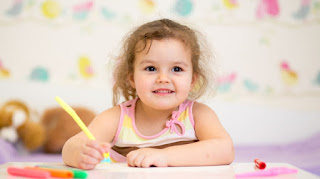If you are a parent of a
toddler who can't seem to sit still or listen mindfully, then that may be a
sign of hyperactivity. You may also get to hear from teachers about your
child's recklessness and lack of care both inside and outside the classroom.
You are in the correct place if you want to know more about hyperactivity in
children as experts from Montessori Eagle Rock CA, is
sharing the causes and symptoms of hyperactivity in toddlers.
First, let's understand
what hyperactivity in children is.
Hyperactivity in children
is characterized by reckless behavior and too much activity that causes a lack
of patience and concentration. Hyperactive kids rarely get tired, have a very
short attention span and can't pay attention to any task. Most of the time
their academic performance is very poor, and they are not able to develop their
social skills. Sometimes they completely refuse to participate in any group activity
which leads to depression, frustration, and poor self-esteem.
Causes of hyperactivity in
toddlers:
Authoritative parenting: Teachers in Preschool
Altadena, CA has observed that authoritative parents become too
rigid with their rules and do not allow their kids to be flexible. They
constantly scold or punish their kids for failing to follow the set routine at
home or criticize them for not getting satisfactory grades in academics. This
type of parenting lowers children's confidence and weakens their self-esteem
which eventually leads to hyperactivity e in the children.
Neglectful upbringing: In some cases, kids
grow up in a very unhealthy environment where they are constantly neglected by
their parents and caregivers. Neglectful upbringing makes kids feel insecure
and inferior. They try to vent out their frustration by reckless and
hyperactive behavior.
Overprotective parenting: According to Montessori
located in Eagle Rock CA teachers,
parents’ overprotective attitude makes kids frustrated, uncomfortable and
hyperactive.
Symptoms of hyperactivity
in toddlers:
- Impulsive behavior or
lack of self-control
- Short attention span
and lack of focus
- Uncontrolled body
movements and motor activities
- Lack of patience and
unable to sit still for some time
- Interrupts any
conversation frequently and shares their ideas and thoughts aloud




Comments
Post a Comment